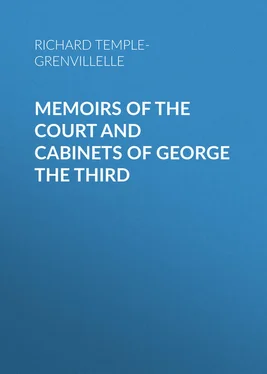Richard Buckingham and Chandos - Memoirs of the Court and Cabinets of George the Third
Здесь есть возможность читать онлайн «Richard Buckingham and Chandos - Memoirs of the Court and Cabinets of George the Third» — ознакомительный отрывок электронной книги совершенно бесплатно, а после прочтения отрывка купить полную версию. В некоторых случаях можно слушать аудио, скачать через торрент в формате fb2 и присутствует краткое содержание. Жанр: foreign_antique, foreign_prose, на английском языке. Описание произведения, (предисловие) а так же отзывы посетителей доступны на портале библиотеки ЛибКат.
- Название:Memoirs of the Court and Cabinets of George the Third
- Автор:
- Жанр:
- Год:неизвестен
- ISBN:нет данных
- Рейтинг книги:5 / 5. Голосов: 1
-
Избранное:Добавить в избранное
- Отзывы:
-
Ваша оценка:
- 100
- 1
- 2
- 3
- 4
- 5
Memoirs of the Court and Cabinets of George the Third: краткое содержание, описание и аннотация
Предлагаем к чтению аннотацию, описание, краткое содержание или предисловие (зависит от того, что написал сам автор книги «Memoirs of the Court and Cabinets of George the Third»). Если вы не нашли необходимую информацию о книге — напишите в комментариях, мы постараемся отыскать её.
Memoirs of the Court and Cabinets of George the Third — читать онлайн ознакомительный отрывок
Ниже представлен текст книги, разбитый по страницам. Система сохранения места последней прочитанной страницы, позволяет с удобством читать онлайн бесплатно книгу «Memoirs of the Court and Cabinets of George the Third», без необходимости каждый раз заново искать на чём Вы остановились. Поставьте закладку, и сможете в любой момент перейти на страницу, на которой закончили чтение.
Интервал:
Закладка:
The Duke of Buckingham
Memoirs of the Court and Cabinets of George the Third / From the Original Family Documents, Volume 2
1788
THE KING'S ILLNESS – CONDUCT OF THURLOW – PLANS OF MINISTERS – DISCUSSIONS IN PARLIAMENT – IRISH VIEW OF THE REGENCY QUESTION – PROCEEDINGS OF THE PRINCE'S PARTY – THE RATS IN BOTH HOUSES.
The fluctuations of the daily accounts from Windsor, and afterwards from Kew, to which place the King was ultimately removed at the instance of the Prince of Wales, and the effect they produced upon the public and the Opposition, greatly increased the difficulties of the Government in this unprecedented emergency. So long as there was the faintest hope of His Majesty's recovery, Mr. Pitt was enabled to avert extremities between the Administration and the Prince of Wales, by repeated adjournments of Parliament. The interest, therefore, which attached to the slightest items of intelligence contained in these letters may be easily understood. All other subjects were of inferior consideration. Even the serious inconvenience occasioned to the public service by the suspension of business in Parliament was forgotten in the one absorbing topic.
The uncertainty that hung over the issue, the responsibility that attended the treatment of the case, and the extreme caution observed by the physicians in the opinions they were called upon to pronounce, kept all classes of the people in a state of constant agitation. The Prince and his supporters availed themselves of these circumstances to strengthen their party in Parliament and out of doors. The passions of the inexperienced, and the hopes of the discontented, are always on the side of youth and excitement; and every vicissitude in the condition of the King that diminished the prospect of his recovery, augmented the ranks of the Opposition, which now became familiarly known as "the Prince of Wales's Opposition." Mr. Pitt acted throughout with the utmost reserve. Deeply impressed by the complicated hazards of the situation, he carefully avoided all allusions to his ulterior intentions in his intercourse with the Prince of Wales, which was strictly formal and official, and confined to such communications as were unavoidable in his position.
MR. W. W. GRENVILLE TO THE MARQUIS OF BUCKINGHAM.
Whitehall, Nov. 15th, 1788.
My dear Brother,
I enclose you the note, which I received from Pitt last night on his return from Windsor. I have seen him this morning; and understand that Warren said one thing which is still more favourable. He told him that a more rapid amendment would, in his opinion, have been a less pleasing symptom; and I find, from Pitt, that on conversing both with Sir G. Baker and Reynolds, he found them rather more sanguine, upon the whole, than Warren, but agreeing with him in his general account. What I have learnt this morning seems to confirm the pleasing hope which I cannot help indulging, from all these circumstances, though, God knows, it is still exposed to much doubt and hazard. The public account, which has been uniformly less flattering than the private letters from Windsor, states that he has had six hours' sleep, and that he is a little better this morning. All the other accounts say that he is certainly getting better.
Pitt saw the Prince of Wales yesterday, for the purpose of notifying to him the step which the Council had taken, of ordering prayers, and of acquainting him that he had written circular letters to all the Members of the House of Commons, stating the probability of Parliament having to meet on Thursday; and that he meant then to propose to adjourn.
Prince of Wales received the communication with civility, and told him he was persuaded no opposition could be made to this. It is, I think, plain, from Pitt's account of his general behaviour, and from what one hears, that my conjecture is right, and that he will dismiss Pitt without hesitation.
Ever most affectionately yours,
W. W. G.
MR. W. W. GRENVILLE TO THE MARQUIS OF BUCKINGHAM.
Whitehall, Nov. 17th, 1788.
My dear Brother,
The accounts for the last two days have been, I think, rather less favourable than that of Saturday, which I sent you. You can, however, hardly conceive the difficulty which we have, even at this small distance, to procure such information as can be in any degree depended on. All the private accounts are so strongly tinctured by the wishes of those who send them, that no reliance can be placed upon them; and the private letters of the physicians are frequently inconsistent with each other, and even with the public account which they send to St. James's. In general, that account has been uniformly found to be the least favourable; and seems as if it was drawn for the purpose of discouraging the hopes which their own letters and conversation excite. The letters which they read to Pitt, though frequently varying in their general tenor from the public account, are not at all more detailed than that is, and take no sort of notice of the most material circumstances. I imagine all this is to be imputed to a difference of opinion which is supposed to prevail amongst them, it being believed that Warren is strongly inclined to think the disorder permanent, and that Reynolds is sanguine in the contrary opinion. Pitt is gone down again to Windsor to-day; but will hardly be back again time enough for me to insert his account in this letter. The public account of to-day says, I understand, that the King has had much quiet and composed sleep, but is nearly the same as before. The sleep, I am told, is generally considered as a favourable symptom.
Under these circumstances, there can, I think, be no doubt that the two Houses will adjourn on Thursday, without opposition.
Everything remains as before. I think you clearly have done right in stopping Corry, it being so much our interest to prevent, and not to promote, negotiation. I think, on more reflexion, that the idea of refusing the power of dissolving is impracticable, and may be turned against us in the end; the other limitations will, I believe, be proposed; and that alone will be sufficient to put all negotiation out of the question.
Fox is expected in three or four days; but it seems impossible that he should be here so soon.
Ever most affectionately yours,
W. W. G.
MR. W. W. GRENVILLE TO THE MARQUIS OF BUCKINGHAM.
Whitehall, Nov. 18th, 1788.
My dear Brother,
I do not find from Pitt that he learnt anything very particular yesterday in addition to what you already know. The King continues much quieter, but still deranged in his intellects and conversation. The fever has not yet entirely left him. The physicians seem very unwilling to say anything with respect to his situation, and declare that it must still be eight or ten days before they can pronounce at all decisively as to the nature of his disorder.
You seem, in your letter, to conceive the point of his recovery to be much more desperate than I understand it to be thought even after a derangement of months, or even years. There hardly passes a day in which one does not hear of cases of that sort, and we are now told that a disorder of this sort has appeared in several instances in Devonshire in the course of this autumn, where the patient has been in this way for six weeks together, and has then entirely recovered.
I have no other news.
Ever most affectionately yours,
W. W. G.
MR. W. W. GRENVILLE TO THE MARQUIS OF BUCKINGHAM.
Whitehall, Nov. 20th, 1788.
My dear Brother,
I went down yesterday to Windsor, as a matter of form, to inquire after the King's health. Having nothing very material to write to you in the morning, I thought it best to take the chance of being back early enough to write before the post went out. This, however, I found impossible, on account of the different people whom I met at Windsor, and with whom I was naturally anxious to converse.
Читать дальшеИнтервал:
Закладка:
Похожие книги на «Memoirs of the Court and Cabinets of George the Third»
Представляем Вашему вниманию похожие книги на «Memoirs of the Court and Cabinets of George the Third» списком для выбора. Мы отобрали схожую по названию и смыслу литературу в надежде предоставить читателям больше вариантов отыскать новые, интересные, ещё непрочитанные произведения.
Обсуждение, отзывы о книге «Memoirs of the Court and Cabinets of George the Third» и просто собственные мнения читателей. Оставьте ваши комментарии, напишите, что Вы думаете о произведении, его смысле или главных героях. Укажите что конкретно понравилось, а что нет, и почему Вы так считаете.












